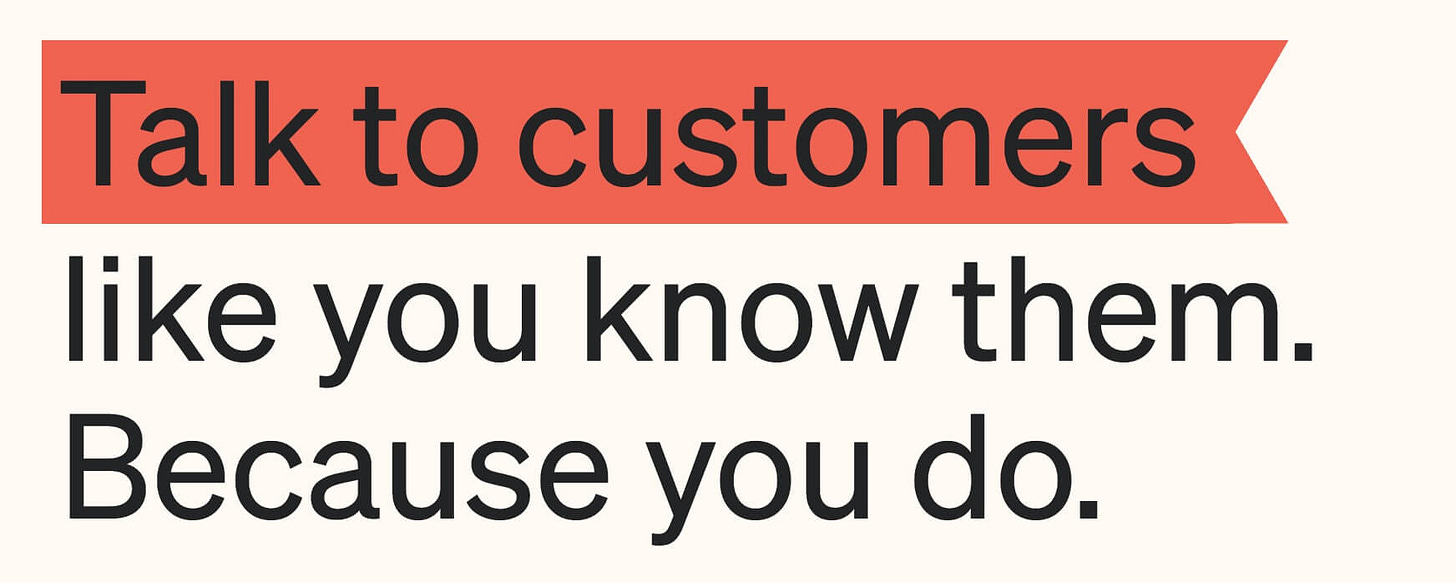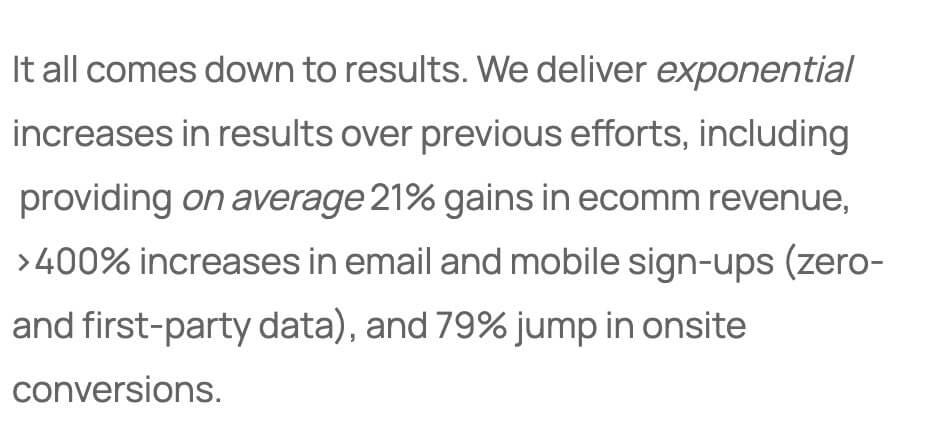It's Time To Do Something about Software Marketing Grammar
And that "something" is to "have singular verbs go with singular nouns" and some other basic grammar rules
I spent some time this week looking at how email and marketing automation platform companies write about what they do, and I noticed some grammatical, uh, mishaps? disasters? garbage? strewn about their marketing, which caused some moderate grammar-induced panic attacks (ask your doctor if once-a-day Gerundia is right for you). And I’ll share some thoughts on those mishaps below.
But first, I thought this was pretty weird. Here’s the headline that marketing automation company Klaviyo uses on their homepage:
And here’s what their competitor Iterable uses as the headline on their homepage:
That’s a little odd, no?
Those companies are competitors - prospects are looking at both Klaviyo and Iterable.
And their websites say virtually the same thing.
I feel like I try to give nuanced advice each week and come up with some cute ways of talking about it so I look smart, because I have a chip on my shoulder and some other issues that maybe I don’t need to talk about here.
But here’s some crazy advice: when you’re updating your website, maybe make sure you aren’t using exactly the same words as your competitors.
Though perhaps using the same language as your competitor is preferable to the alternative, which appears to be marketing automation companies vomiting up streams of gobbledy the likes of which we haven’t seen since the never-gets-old video “like also such as.”
Iterable was built from the ground up for speed and scale. Email, mobile push, SMS, in-app notifications, web push, social and more were engineered to work together seamlessly. Personalize each channel to serve a unique purpose as you build a cohesive lifecycle experience for your customers.
vs
Cordial is the cross-channel marketing and data platform for customer-obsessed brands. We feel it should be easier to send messages your customers love. Cordial lets you collect all of your data in one platform, use it to build audience segments, design messages, and orchestrate campaigns across email, SMS, and mobile app – ultimately creating better campaigns, faster.
Hm, speed and scale vs. better campaigns faster. Tough call.
vs
Sailthru's cross-channel customer engagement solution is built to help marketers connect on a deeper level with each and every consumer, by delivering personalized experiences across email, web, mobile, and now, SMS. It’s designed to help you move at the speed of your customer… so you can achieve more, faster.
Achieve more faster!
That 32 word short story is a nominee for the 2022 Gobbledy Longest Website Sentence award. Mazel Tov on that, Sailthru. Also “each and every customer.” Not just every customer.
Or let’s see:
Listrak:
You can send messages at precisely the right time across the right combination of channels and devices to maximize customer engagement, revenue, and lifetime value.
vs.
Omnisend:
Target the right people with the right message at the right time using built-in segments that update in real time. Segment your audiences based on campaign activity, shopping behaviour, and more to get ongoing sales power across the whole customer lifecycle.
I guess I’ll decide if I want to send messages at the right time or precisely the right time. I’ll ask Gartner what they think.
OK enough.
I got distracted there from my original plan, which was to just call out some of the grammatical errors/liberties/errors that made me think, “would I really trust this company to send out my company’s communications if they can’t match subjects and verbs?”
(And yeah, I know, I’m a little annoying about this. I’ve mentioned her before, but my 6th grade English teacher Mrs. Molloy is responsible. It’s her fault. I was terrified of her, and she scared the crap out of all of us, and I was too afraid not to diagram sentences correctly. And now I’m punishing all of you.)
I don’t want to complain without also offering a solution, so here’s the solution: There are companies that will help you with this. Like these guys. (Hey, that’s my company!) - I’m happy to help you.
On to the fun…
No, growth doesn’t come easy; it comes easily. That’s how it comes. Easy is an adjective. Easily is an adverb. The word is modifying “comes” (a verb) so it takes an adverb (of millions to hold us back, as Chuck D once said.).
I’ll forgive “we got you” rather than “we’ve got you” as an attempt to be casual. (Though being grammatically correct does not mean you’re not casual.) But I will not forgive “drives” when it should be “drive,” as the “marketing tools” are what are doing the driving.
Instead - Omnisend gives you easy-to-use ecommerce marketing tools that drive sales impact…
(I mean, I wouldn’t use those words. Everyone uses those words. But it’s grammatically correct. I might suggest something a little more irreverant: “Don’t blame us when your email marketing manager leaves because you didn’t select Omnisend.” Or maybe, “The only email tool your sales team will thank you for choosing.”)
This sentence really wants to say, “your customers are all unique - your communication with them should be unique too.” As in, your communication with customers should be unique, just as your customers are unique.
But that’s not what it says. In the original sentence, “unique” is modifying “individuals,” so it’s saying “your customers are all individuals - your communication with them should also be individuals.” That doesn’t make sense.
(We can argue whether “connecting your brand’s experience with how your customers engage online” makes any sense. Actually we cannot argue that…it also doesn’t make sense, but it’s a gobbledy problem, not a grammar problem.) Please note, your brand doesn’t have an experience, people experience your brand. In any case, drop “individuals” and it works.
I’ll put aside the clunky “providing on average 21% gains” (rather than “on average providing 21% gains”) and the weird “greater than” symbol after the comma (“revenue, >400% increases…”)
But I won’t put aside “and 79% jump in onsite conversions” when it should be either “a 79% jump in onsite conversions” or - though not my preference - “79% jumps in onsite conversions.” They could clear this whole thing up by rewording the sentence, “a 400%+ increase in email and mobile sign-ups, and a 79% jump in onsite conversions.” Though why is it “ >400%” (an estimate) in the first part, but the very exact “79%” in the second part?
And all those numbers listed in a sentence get lost. When you want to share a bunch of data like that, use bullets.
Alright, last one for today:
Oy.
“One of its kind” means “there are many of this thing, and this is one of them.” That’s the opposite of what they’re trying to say, which is “one of a kind.” Though it’s used here as an adjective, so it would be one-of-a-kind (hyphenated). And they forgot the “a” in front of “one-of-its-kind.”
The clause “that is all encompassing” is stuck like a speed bump in a school zone in the middle of that sentence and also should be “all-encompassing” (hyphenated). Assuming we even want this clunker of a construction, a better option would be “Offering an all-encompassing, one-of-a-kind automated, scalable and secure ecosystem, CleverTap helps…”. (Note - we don’t want that clunker of a construction.)
But while that is grammatically correct, it’s a mess.
This gets at the underlying problem:
All these companies are trying to jam as much possible information as they can into each sentence. So you end up with prepositional phrases piled on top of hyphenated compound words, held together with a mishmash of 10 cent words and run-on modifiers. Of course the grammar will be a mess, because the sentence is trying too hard.
So let’s assume CleverTap actually does want to get all of that info to the reader. Instead of that seven-car-pileup of a sentence, they could go with:
Only CleverTap uses powerful AI/ML models to help companies understand, segment and engage users in real time. Plus, our clients sleep well knowing our ecosystem is uniquely scalable and secure.
That’s not going to win a Pulitzer (?) (or a Gobbledy Award, for that matter), but it’s legible and you get the main points.
So much of this comes down to fear - fear that you’re not including every possible value proposition, every possible reason someone is looking at your product, every possible objection. Your buyers are smart and well-informed. They’ve likely already done research. Confusing them with convoluted sentences accomplishes the opposite of what you’re trying to do.
I promise you - if you were to go through your site and take out 1/3 of the points you’re trying to make, it would make what’s left much more impactful. And make the sentences that remain much more clear. Mrs. Molloy will thank you.
If this brought even the absolute tiniest amount of joy to your day, consider sharing it with a friend. Or frenemy. Or any other portmanteau. Gobbledy readers love portmanteaus. I’ve made it easy with the share button (shabutton) below. Thank you.









I can attest that Mrs Malloy would be proud to see this gem! Well done, sir.
"Exponential growth" that accelerates. Someone should tell Listrak that.